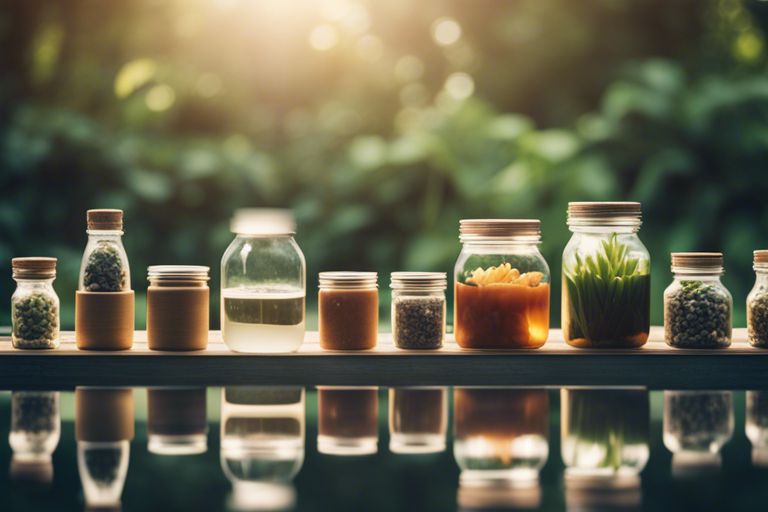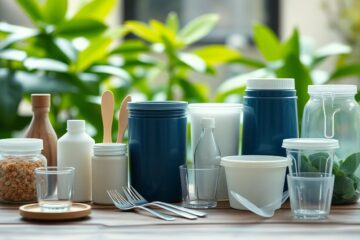Ecological sustainability is the need of the hour, and one of the most pressing issues currently facing our planet is the overwhelming use of single-use plastics. The impact of single-use plastics on our environment is alarming, with devastating effects on our oceans, wildlife, and human health. However, there are simple and effective ways that each of us can make a difference in reducing our plastic consumption. In this blog post, we will explore 10 critical steps that anyone can take to help eliminate single-use plastics from their daily lives. By making these changes, we can all contribute to a healthier, more sustainable planet for future generations.
Table of Contents
Key Takeaways:
- Reduce plastic waste: By ditching single-use plastics, we can significantly reduce the amount of plastic waste that ends up in landfills and oceans, helping to minimize environmental damage.
- Embrace reusable alternatives: Switching to reusable bags, water bottles, and containers can help cut down on the need for disposable plastics, leading to a more sustainable lifestyle.
- Promote eco-friendly choices: Encouraging others to make greener choices and advocating for policies that reduce plastic usage can create a positive impact on a larger scale.
Carry Reusable Bags
For individuals looking to reduce their plastic waste, one of the simplest swaps to make is to carry reusable bags when shopping. By bringing your own bags, you can avoid the need for single-use plastic bags and significantly reduce your environmental impact.
Avoid plastic bags
Plastic bags are one of the most common types of single-use plastics found in our environment. They are not only detrimental to wildlife and marine life but also take hundreds of years to decompose. By avoiding plastic bags and opting for reusable alternatives, we can drastically reduce the amount of plastic pollution in our world.
Choose cloth or paper
To further minimize your reliance on plastic bags, consider choosing cloth or paper bags as your go-to reusable option. These materials are biodegradable and can be used multiple times, making them a more sustainable choice for carrying groceries and other items.
It is important to note that while cloth and paper bags are more eco-friendly than plastic, their production still has environmental impacts. However, their ability to be reused and eventually composted makes them a less harmful option compared to their plastic counterparts.
Use Reusable Bottles
The use of reusable bottles is an essential part of reducing our reliance on single-use plastics. By opting for reusable bottles, we can significantly cut down on the amount of plastic waste produced in our daily lives. Here are some ways to make the switch to reusable bottles.
Ditch plastic water bottles
On your next grocery run, consider purchasing a durable, BPA-free water bottle that you can refill as needed. Ditching plastic water bottles not only eliminates the need for single-use plastics, but also reduces the risk of consuming harmful chemicals such as BPA that can leach into the water. By choosing reusable bottles, you can take control of your hydration without contributing to plastic pollution.
Prefer stainless steel, glass
bottlesWhen choosing a reusable bottle, consider opting for materials such as stainless steel or glass instead of plastic. Stainless steel bottles are durable, long-lasting, and are not prone to leaching harmful chemicals. Glass bottles are also a great alternative as they are nonporous, meaning they won’t retain flavors or odors from your beverages. Additionally, both stainless steel and glass are recyclable, making them a more sustainable choice for your hydration needs.
Glass bottles, in particular, are a safer option for storing both hot and cold beverages, as they do not contain harmful chemicals such as BPA or phthalates. Making the switch to stainless steel or glass bottles is a simple yet impactful way to reduce plastic waste and decrease our environmental footprint.
Pack Food in Containers
Not only do single-use plastics contribute to the growing pollution crisis, but they also harm wildlife and ecosystems. One way to reduce your plastic waste is by packing your food in reusable containers. This not only helps the environment, but it also saves you money in the long run.
Use beeswax wraps, boxes
One alternative to plastic wrap and bags is to use beeswax wraps and boxes. These are made from biodegradable materials and can be used multiple times. Beeswax wraps are perfect for covering bowls and wrapping sandwiches, while boxes are great for storing leftovers and transporting food on the go.
Shun cling film, foil
With the abundance of single-use plastics, it’s important to shun products like cling film and foil. These items are not only harmful to the environment, but they also pose risks to human health. Cling film can leach harmful chemicals into food, and foil is not recyclable in many areas.
Beeswax wraps are a great alternative to cling film and foil, as they are reusable and biodegradable. By making the switch to beeswax wraps and boxes, you can significantly reduce your plastic waste and protect the environment for future generations.
Say No to Straws
After plastic bags and bottles, straws are one of the most prevalent single-use plastic items that end up in our oceans and landfills. Over 500 million plastic straws are used every day in the United States alone, contributing to the growing global plastic pollution crisis. Saying no to plastic straws is a small but impactful step towards reducing our plastic waste and protecting our environment.
Skip plastic straws entirely
Straws are often an unnecessary addition to our drinks, and skipping them entirely is the easiest way to eliminate plastic straw waste. When ordering a drink at a restaurant or cafe, simply request no straw with your beverage. If you really need a straw, consider bringing your own reusable one made of paper or metal.
Opt for paper, metal
Paper and metal straws are great alternatives to single-use plastic straws. Paper straws are biodegradable and readily available at many retailers, while metal straws are durable, reusable, and easy to clean. Both options reduce the need for single-use plastic straws and are better for the environment. By choosing paper or metal straws, you can enjoy your drinks without contributing to the plastic pollution problem.
Any effort to reduce plastic waste, such as opting for paper or metal straws, is a step in the right direction towards a more sustainable future. By making the switch to reusable alternatives, you are helping to protect marine life, reduce plastic pollution, and minimize our environmental footprint.
Bring Own Coffee Cups
Nowadays, it’s important to be mindful of the waste we generate from our daily habits. One simple way to reduce single-use plastics is by bringing our own coffee cups when we head to our favorite coffee shops or cafes. This small change can make a big impact on our environment.
Refuse disposable coffee cups
Refuse to accept disposable coffee cups when you order your favorite hot beverage. Politely ask the barista to use your reusable cup instead. By doing so, you are preventing unnecessary waste from ending up in landfills or polluting our oceans. Those disposable plastic lids and liners are a major contributor to environmental pollution, and by refusing them, you are taking a stand against single-use plastics.
Select reusable travel mugs
Any time you plan to enjoy a hot drink on the go, opt for reusable travel mugs. These mugs are designed to keep your beverages hot while also being eco-friendly. There are many stylish and convenient options available, so you can find one that suits your personal style and lifestyle. By choosing to use reusable mugs, you are reducing your reliance on disposable cups and contributing to a cleaner, healthier planet.
Use Matches or Rechargeables
Unlike disposable plastic lighters, matches and rechargeable lighters are sustainable alternatives that can help you reduce your single-use plastic consumption. By making a simple switch to matches or rechargeables, you can significantly reduce the amount of plastic waste that ends up in landfills and our oceans.
Avoid disposable plastic lighters
One of the most common sources of single-use plastic waste is the disposable plastic lighter. These lighters are used once and then tossed away, adding to the global plastic pollution problem. Not only are they wasteful, but the plastic components can also release harmful toxins when they are disposed of improperly, posing a threat to the environment and wildlife. By opting for matches or rechargeable lighters instead, you can avoid contributing to this environmental issue.
Pick wooden matches, USB
The next time you need to light a candle or start a fire, consider using wooden matches or a USB rechargeable lighter. Wooden matches are biodegradable and can be easily disposed of without harming the environment, while USB rechargeable lighters can be used multiple times before needing to be recharged, reducing the amount of plastic waste generated. Making the switch to these sustainable alternatives is a simple but effective way to decrease your reliance on single-use plastics.
Matches and USB rechargeable lighters offer a more environmentally friendly way to light fires and candles, reducing the need for disposable plastic lighters and their detrimental impact on the environment. By choosing these options, you can significantly reduce your plastic waste footprint while still enjoying the convenience of lighting tools. Making small changes like this can have a big impact in the fight against plastic pollution.
Choose Bar Soaps
Now, let’s talk about the benefits of choosing bar soaps over their plastic-packaged liquid counterparts. Not only are bar soaps typically packaged in paper or cardboard, making them more eco-friendly, but they also tend to last longer, saving you money in the long run. By making the simple switch to bar soaps, you can significantly reduce your plastic waste and overall environmental impact.
Use soap bars, shampoo
Shampoo bars are another excellent option for ditching single-use plastics. These solid shampoo bars are long-lasting, and many are made with natural ingredients, free from harsh chemicals. By using shampoo bars, you can reduce the amount of plastic bottles that end up in landfills or our oceans, while still keeping your hair clean and healthy.
Bypass plastic soap dispensers
Soap dispensers are often made from plastic and can contribute to the single-use plastic problem. One way to bypass these plastic dispensers is by opting for bar soaps instead. By doing so, you eliminate the need for plastic packaging and reduce your overall plastic waste. This small change can have a significant impact on the environment.
The simple act of switching to bar soaps and bypassing plastic soap dispensers can greatly reduce our reliance on single-use plastics and help protect our planet for future generations. By making these small changes, we can all play a part in creating a cleaner, healthier environment for everyone.
Shop in Bulk
Keep your kitchen stocked with essentials by shopping in bulk. This not only reduces the amount of packaging waste you generate but also saves you money in the long run. Look for stores that offer a wide variety of bulk foods, from grains and nuts to spices and snacks.
Purchase loose fruits, vegetables
Bulk up your diet with fresh produce by purchasing loose fruits and vegetables. This not only eliminates the need for plastic packaging but also allows you to buy only what you need, reducing food waste. Look for local markets or grocery stores that offer a diverse selection of loose produce.
Fill reusable containers, bags
For items like grains, nuts, and dried fruits, fill reusable containers or bags instead of opting for pre-packaged options. This allows you to buy in bulk while avoiding unnecessary plastic packaging. With a variety of reusable containers and bags available, you can easily store and transport your bulk purchases without creating additional waste.
With the rise of single-use plastics, it’s more important than ever to take action and reduce our environmental impact. By shopping in bulk and using reusable containers and bags, you can significantly cut down on the amount of plastic waste you produce. Take the initiative to make a positive change and inspire others to do the same.

Buy Secondhand Items
Your commitment to reducing single-use plastics can start with the items you bring into your home. By purchasing secondhand goods, you are not only diverting items from landfills but also reducing the demand for new plastic packaging.
Shop pre-owned goods
To minimize your impact on the environment, consider shopping at thrift stores, online marketplaces, and garage sales for pre-owned items. This way, you are giving a new life to products that would otherwise end up in a landfill, while also avoiding the plastic packaging that often comes with brand-new items. Look for secondhand options for clothing, furniture, kitchenware, and more.
Minimize new plastic packaging
An easy way to reduce your plastic consumption is to opt for products with minimal or no plastic packaging. When purchasing secondhand items, be mindful of the packaging they come in, and choose those with minimal plastic. By doing so, you are avoiding the need for new plastic production and reducing your environmental footprint. Plus, you’ll be contributing to the circular economy by extending the life of existing products.
Plus, by choosing pre-owned goods, you are also supporting sustainable consumption and production, and contributing to waste reduction efforts. This small change in your shopping habits can make a significant impact on the environment and help pave the way for a greener, more sustainable future.
Conclusion: Go Green – 10 Simple Ways To Ditch Single-Use Plastics
With this in mind, it is clear that there are numerous simple and practical ways to reduce single-use plastics in our daily lives. Making small changes, such as using reusable shopping bags, water bottles, and containers, can have a significant impact on reducing the amount of plastic waste that ends up in landfills and oceans. Additionally, supporting businesses and organizations that are committed to sustainable practices and investing in eco-friendly products can further contribute to a more environmentally friendly and plastic-free future.
It is important for individuals to take responsibility for their own plastic usage and actively seek out alternatives to single-use plastics. By incorporating these 10 simple ways to ditch plastic into our daily routines, we can collectively work towards a cleaner and healthier planet for generations to come. It is essential that we continue to advocate for sustainable practices and raise awareness about the harmful effects of single-use plastics to inspire positive change on a larger scale.
FAQ
Q: Why should I ditch single-use plastics?
A: Single-use plastics contribute to environmental pollution and harm to wildlife. By reducing single-use plastics, we can decrease our carbon footprint and help protect the planet for future generations.
Q: What are simple ways to start going green and ditch single-use plastics?
A: You can start by using reusable water bottles and coffee cups, bringing your own shopping bags, and opting for products with minimal packaging. These small changes can have a big impact on reducing plastic waste.
Q: How can I avoid single-use plastic when grocery shopping?
A: You can bring your own reusable shopping bags and produce bags, look for products in glass or cardboard packaging, and opt for fresh produce instead of pre-packaged items. Additionally, buying in bulk can help reduce plastic waste.
Q: What are some alternatives to single-use plastic items?
A: Instead of using plastic straws, opt for stainless steel or bamboo straws. Replace plastic food storage containers with glass or stainless steel containers. Also, consider using beeswax wraps instead of plastic wrap for food storage.
Q: How can I encourage others to ditch single-use plastics?
A: Lead by example and share information with friends and family about the harmful effects of single-use plastics. Encourage them to make small changes in their daily habits, such as carrying reusable utensils or refusing plastic straws when dining out.

Our contributing author is a passionate advocate for eco-friendly living and sustainability. With a background in eco-life, they are dedicated to inspiring and empowering individuals to adopt environmentally conscious lifestyles. Through insightful articles, they share practical tips, innovative solutions, and thought-provoking perspectives to promote a greener, more sustainable world. Join them on the journey towards eco-smart living and discover how small choices can make a big impact. 🌱








